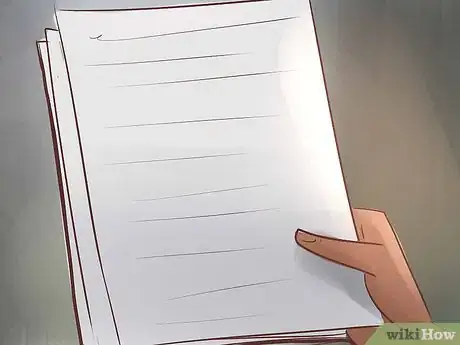wikiHow is a “wiki,” similar to Wikipedia, which means that many of our articles are co-written by multiple authors. To create this article, 16 people, some anonymous, worked to edit and improve it over time.
There are 7 references cited in this article, which can be found at the bottom of the page.
wikiHow marks an article as reader-approved once it receives enough positive feedback. In this case, 90% of readers who voted found the article helpful, earning it our reader-approved status.
This article has been viewed 41,946 times.
Learn more...
If you love reading books, have a knack for writing, and enjoy expressing your opinion, you may want to consider becoming a book reviewer. But how do you get started? Luckily, there are now more options than ever before. Depending on your interests and skills, you can become a book reviewer for fun, for free books, or even perhaps for a career.
Steps
Becoming a Reviewer
-
1Read lots of books, and lots of reviews. Let’s face facts: if you don’t love reading, you won’t like being a book reviewer. Read widely to familiarize yourself with the new trends and the lasting staples of the book industry, and read reviews for inspiration and guidance.[1]
- If you already have your sights set on reviewing for a particular publication, or in a particular field or genre, read lots of relevant reviews. Get a feel for the language, style, and content that reviewers in that vein utilize. Take note of what you feel works and what does not.
- Try to realistically assess your skills and commitment. Can you read books quickly but with a full grasp of the material? Do your writing abilities approach the level of the reviewers you’d like to join? Regardless, there are options available to you, but you may need to temper your dreams of achieving fortune or fame. (Although, honestly, you probably shouldn’t see book reviewing as a path to those things anyway!)
-
2Review books on retailer websites. There’s nothing wrong with starting small, in a low-pressure environment. A few people do gain a reputation and even some income by reviewing books on sites like Amazon, but you should view it more as practice that may help some fellow book-lovers along the way.[2]
- At most, you’ll have to create an account in order to review books, but take the process seriously if you are indeed serious about being a book reviewer. Read the books you review, obviously. Take some time to craft thoughtful critiques that you would be proud to claim as your own.
- Even simple reviews like these can be used as samples of your work if you want to advance in the book-reviewing business. So make them good samples.
Advertisement -
3Start a book review blog. If you simply enjoy sharing your thoughts about books you have read, this may be all you need. But it can also potentially be a springboard to bigger things as well.
- Once again, focus on producing quality work. You’re the boss and your own editor, but don’t take it easy on yourself. Take some time crafting your reviews, and proofread them. Quality blog reviews can be used as “clips” (samples) for a reviewing job application.[3]
- After you’ve gotten your blog off the ground, contact publishers about your interest in reviewing their books. You may find yourself being sent free books to review. Your only obligation should be to give the book a fair reading and review (positive or negative), but do disclose to your readers that you were sent a free copy in return for an independent review.[4]
- Beyond adding to your book collection free of charge, you may be able to make a bit of money through your blog reviews. If you obtain an affiliate code from Amazon, for instance, you will receive a small commission any time someone clicks through the link in your review and buys the book from Amazon. Again, you should disclose this arrangement to your readers.[5]
-
4Plan your next moves. Congratulations. By this point, you can legitimately call yourself a book reviewer. If you have more in mind, but still aren't seeking a career out of it, you still have several options to consider. For instance:
- There are numerous book review websites that will provide you with even more free books and perhaps even a bit of cash in return for independent, quality reviews.[6]
- If you really want to see your name (and work) in print, you can find many literary journals that simply require evidence of your reviewing skills in order to sign you up in a freelance capacity. Again, you may be working for free books or a bit of money.
-
5Seek a professional reviewing job. If you are determined to work your way up to reviewing books as a career, you’ll need to start making connections and building up your portfolio. Not surprisingly, there aren't thousands of professional book reviewer jobs just sitting around waiting to be filled, so you'll have to be persistent and realistic.[7]
- Contact a group such as the National Book Critics Circle (NBCC, http://www.bookcritics.org/) and request a directory of book review editors. Use this list to determine which publications to target and which editors to contact.
- If you have any inside connections with someone who works at one of the publications, by all means use it to facilitate contact with the editor. You'll need all the help you can get.
- Assemble the best “clips” from your existing reviews and contact the review editor(s) at your target publication(s). (Don’t expect to start with the New York Times. Focus first on smaller local or regional publications.) Express your interest and offer to provide your sample work.
- Request catalogs from major publishing houses so that you can pitch reviews for forthcoming titles as part of your application. After all, you won't be reviewing books that are already out.
- Be persistent but not aggressive with follow-up emails. You want to show your sincere interest without annoying an overburdened review editor.
Succeeding as a Reviewer
-
1Develop a specialty. There is value in demonstrating that you can review any kind of book, from kids’ stuff to romance novels to biographies. However, demonstrating a particular specialty will make you more marketable if your desire is to become a professional reviewer.[8]
- Ideally, of course, your area of specialty in book reviews will be based on your personal taste, and your training, education, and/or experience.
- Practically speaking, though, if you can fill an area of need with your review specialty, you will improve your odds of snagging a job. Keep up with your reading so that you are familiar with what genres are “hot” in the publishing industry.
- Your goal is to become the “go to” person whenever a particular type of book lands on the editor’s desk.
-
2Follow rules and deadlines. With your book review blog, you make the rules and set the deadlines. If you want to achieve more as a book reviewer, though, you must quickly learn that making your editor happy is essential.[9]
- Carefully read over any style or formatting guides, and take word counts seriously. Space is at a premium for most book reviews, so you need to be able to winnow down your writing to the essentials, while still providing the necessary information and critique.
- Don’t take on a review if you are not sure that you can complete it on time. Regularly missing deadlines is one of the easiest ways to get on an editor’s bad side — and another willing and capable reviewer can almost always be readily found.
-
3Guide the reader into the book. There is no single correct way to write a book review, of course. Some reviewers emphasize recapping the work, others focus on the critique. With all the information and opinion now available on any given book, however (think of the blogs and Amazon reviews, for instance), a standout review will offer something more.[10]
- Reading a book, especially a good book, is all about making a personal connection between the reader and the world evoked by the words on the page. Think of it as your job as the reviewer to help prepare potential readers for entering this world. Share your unique experience with the work as a guide for them.
-
4Listen to expert advice. About forty years ago, the renowned author John Updike came up with a list of six rules for book reviewers. These rules are still widely circulated and embraced by reviewers today, and are well worth considering for any aspiring reviewer. They include:[11]
- Try to understand what the author intended to write, and don’t punish him or her for something her or she did not attempt to do.
- Provide enough quotations from the work to give the review reader a feel for the quality of the prose.
- Confirm your description of the work with quotations and other evidence from it.
- Limit your plot summary, and never give away the ending. Don’t spoil the experience for others.
- When a book is deficient in quality, cite similar examples of good books (perhaps even by the same author). Try to understand and explain what went wrong; don’t just do a “hatchet job.”
- Don’t review books your are predisposed to dislike or like (for instance, one written by a friend); don’t see yourself as a caretaker for some tradition or standard of literature; don’t try to put an author “in his place” with your critique; and always review the book, not the reputation.
Community Q&A
-
QuestionAs a critic, aren't you supposed to try to see the good and bad? Even if you don't like it?
 Community AnswerYes, I'd say that you should. When reviewing something, you want to look at it fairly, and try to analyze it from an objective stance instead of only relying on your own personal opinions. While your opinion as a reviewer does matter, you should also be fair, and try to see both the good and bad sides of what you've read.
Community AnswerYes, I'd say that you should. When reviewing something, you want to look at it fairly, and try to analyze it from an objective stance instead of only relying on your own personal opinions. While your opinion as a reviewer does matter, you should also be fair, and try to see both the good and bad sides of what you've read. -
QuestionWhat things should you not say when reviewing a book?
 PierceCommunity AnswerWhen reviewing a book, you are basically meant to explain your opinion about the structure and writing style of the book. What you need to try to avoid when reviewing is going on about an off-topic question or adding superfluous information that has no bearing on the book.
PierceCommunity AnswerWhen reviewing a book, you are basically meant to explain your opinion about the structure and writing style of the book. What you need to try to avoid when reviewing is going on about an off-topic question or adding superfluous information that has no bearing on the book.
References
- ↑ http://rebeccaskloot.com/tips-for-successful-book-reviewing/
- ↑ http://www.forbes.com/2006/11/30/donald-mitchell-amazon-tech-media_cz_hc_books06_1201amazon.html
- ↑ http://rebeccaskloot.com/tips-for-successful-book-reviewing/
- ↑ http://www.authormedia.com/become-a-book-blogger/
- ↑ http://michaelhyatt.com/five-ways-to-comply-with-the-new-ftc-guidelines-for-bloggers.html
- ↑ http://realwaystoearnmoneyonline.com/2015/03/how-to-become-a-paid-book-reviewer.html
- ↑ http://rebeccaskloot.com/tips-for-successful-book-reviewing/
- ↑ http://rebeccaskloot.com/tips-for-successful-book-reviewing/
- ↑ http://rebeccaskloot.com/tips-for-successful-book-reviewing/
About This Article
To become a book reviewer, you’ll need to be an avid reader and also read lots of book reviews so you can get a sense of the latest trends. Additionally, try starting out by writing reviews on retail sites like Amazon to gain practice, which you can do after you set up a customer account. You could also create your own book review blog, and contact publishers in your desired field to request free books to review. If you want to turn your book reviewing hobby into a profession, contact the National Book Critics Circle, or send samples of your reviews to literary journal editors. For tips on how to write a good book review, read on!




































































